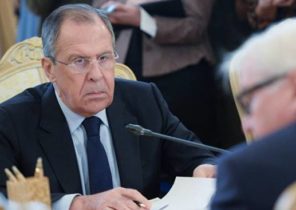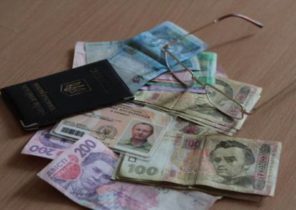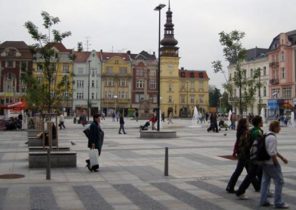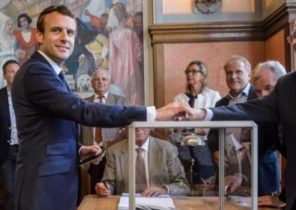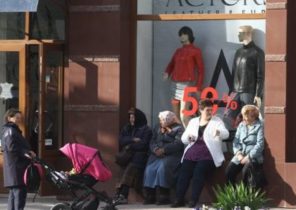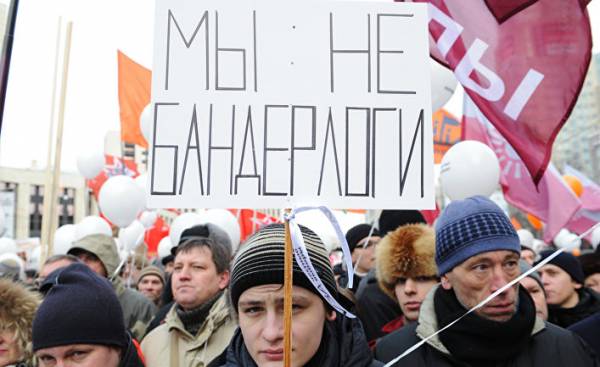
The Kremlin has no shortage of problems, but one of the biggest was in a rather unusual form, it is the teenagers. In March, more than 80 Russian cities were engulfed by the wave of protests, a role in which he played the young political activists of the country. Pictures of teenagers climbing on street lights, conversing with the crowd and detained by police officers flooded the Internet. Many Russian media have wondered whether the emerging movement the youngest ever seen. Generation Z, as yet unknown and unexplored segment of the Russian society has entered the political arena as a group fully formed and politically conscious people. This is stated in the material the American private intelligence analysis company Stratfor, which is in the order of “Apostrophes”.
Few foresaw it. In the end, the older generation still remembers communism and the Soviet system of priorities, when the welfare state was put above all other things, and to demand the right to the pursuit of happiness was unthinkable.
But the current demonstrations slowly brewing over the previous six years. In 2011, the public tired of the corruption in the highest echelons of the government, took to the streets to protest against falsified elections. The seed of dissatisfaction with the political system were planted, and in 2017 it is fully blossomed in the protest against the decline of the Russian economy and reduce living standards. What linked these two movements? The injustice of it all.
It is not surprising that these protests have attracted teenagers. They took to the streets not because of Western sanctions, but because of the overwhelming feelings of injustice, which, at some point it becomes impossible to ignore. Six years ago, some children accompanied their parents to the anti-corruption rallies. Now, some parents follow their children (many of whom are now from 17 to 19 years) at the demonstration. Next year, about 4 million of those Teens will be old enough to vote — and some of them seem to have decided to use this right for action.
Bored, informed and unpunished
As generation Z has become so different from its predecessors? First, its members are born and brought up in the era of Vladimir Putin’s presidency, they have never known another leader. One of the recent slogans of the protest was “Putin, you’re boring” — an attitude that is common among today’s young people. They want to see a new face.
On the other hand, generation Z grew up in the Internet era. More than 70% of Russian youth use the Internet to read the news, constantly watching over the enormous flow of information, rapidly spreading through social networks.
Finally, this first generation of “unwhipped”. Although the Soviet school is not subject to any corporal punishment, their philosophy was sending students a clear message: obey or be punished.
In addition, generation Z was raised by parents who in General have adopted humanistic methods of education, maintaining an unprecedented level of equality between adults and children.
YouTube-revolution
For many years Russian society perceived the adolescents as apolitical young people more interested in Internet memes and video watching than participation in political life. But it is obvious that there is something more. Not only the Kremlin has lost the ability to provide Russian youth its a satisfying picture of the world, most of the media too. You can not say about the opposition leader Alexei Navalny. Understanding the power of YouTube and other social networks, a critic of the Kremlin has attracted many teenagers to the business.
Instead of having to watch state television channels, which are fed by Putin’s propaganda citizens throughout the country, young people have turned to the Internet to find an objective reality. And some found her at the Fund of struggle against corruption (FBK) Alexei Navalny. After investigation about a huge secret assets, Prime Minister Dmitry Medvedev FBK created a sarcastic video called “you do not Dimon” and published it on YouTube. Instead of compiling long dull texts organization Navalny joined in the video memorable soundtrack with the well-drawn infographics to ridicule Medvedev. The video went viral, and adolescents of the country demanded that something was done with the tendency of the Prime Minister to luxury.
Close to Putin billionaire Alisher Usmanov in may tried to resist Bulk, releasing two videos with the slogan “FIE on you, Alexei Navalny”. Although Usmanov and received millions of views online, focused mostly on unflattering memes and stickers in Telegram messenger.
Voices of change
After the March protests, the Russian analysts scribbled page after page with an explanation of the demographic transition. But, thanks to an open platform, where teenagers were asked to explain their decision to go to the protests, it became clear that they can — and want — to speak for themselves.
Marat, a senior, said:
“We live in this country, we will not let the crooks was robbing the state, that is stealing our money. Need to go on a “walk” (protest — “Apostrophe”), because these thieves are afraid, they have something to lose, so they sent us a bunch of police and arrested more than a thousand people only in Moscow.”
Student named Ivan shared his frustration:
“I don’t like that our country is run by thieves and fraudsters that our state resources are not used fully for the benefit of people. I believe I had every right to go to the rally, demanding from the authorities the answers to all the allegations of corruption”.
Svetlana, the schoolgirl, he added:
“For more than six years we at school talk about the unknown, tempting and hypothetically existing things — “democracy in the Russian Federation”. In class-meet the teacher: “Russia is a social state which guarantees citizens rights, pensions, benefits to vulnerable categories of the population. Yes, and we’re all happy, of course.” And I get “excellent”. But all this lies on which everyone agrees, knowing that a single right — to remain silent”.
A young man named Yevgeny said:
“We oppose the violation of our personal cyberspace, we don’t want this clown Medvedev continued to hang noodles on the ears that has no money. And that can make a student 16-17 years old? We are still unable to vote. Only through rallies, we can show the authorities that we are dissatisfied.”
Some sociologists doubt that at the meetings this year were more teenagers than in demonstrations that began in 2011. But many noted an important change in public sentiment. The independent research team led by sociologist Alexander Bikbov conducted a series of interviews on the streets of Moscow on March 26. One slogan, in particular, has attracted the attention of researchers: “the Return of hope.”
Contrary to the feeling of helplessness and despair, which permeated Russian society in the last few years, the answers conveyed the determination of the protesters. Several interviews showed that people had joined the demonstrations to support each other, to show growth in the number and encourage others to participate. According to Bikbov: the theme of “unity”, absent in 2015-2016, today strong.
Times have changed in Russia, and a new generation has grown up, unbeknownst to all. This generation has learned to voluntarily engage in movement, to cooperate with each other to Express their opinion and to uphold justice. Inspired by the openness of the Internet and tired of television, these young people are smart and motivated. But most importantly — they don’t want to leave Russia. Instead, they want to change it for the better. And if the March movement was a demonstration, they will be hard to silence.
